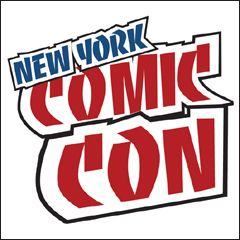One of the under-analyzed indicators of comics' recently improved health is the seemingly exponential growth of convention attendance. Rarely does a Comics A.M. goes by where some convention, even a smaller, regional one, isn't reporting how attendance is up from the previous year and they're expecting even more the next; often it's in the thousands, headed into tens of thousands.
That seems to be in direct contrast to conventional wisdom: Digital comics sales are increasing, most comics creators are a tweet away, and travel in this still-sluggish economy is still cost-prohibitive for a lot of fans. Yet, just as print sales in the direct market have been steady, and even improving, attendances at comics conventions is up virtually across the board.
The leader of this pack is easily New York Comic Con. In just seven short years, it has positioned itself as the comics convention of the year, providing stiff competition for the long-held leader Comic-Con International. In fact, New York Comic Con hit San Diego-sized attendance numbers this year.
Clearly aware of NYCC's growing size and importance, publisher are making bigger and bigger announcements there. In 2009, Marvel revealed in San Diego that it had acquired the rights to Marvelman/Miracleman, but it was this year at New York that the publisher announced it will reprint the acclaimed Alan Moore/Neil Gaiman run. DC Comics announced the all-star line-up of Detective Comics #27 ,with Frank Miller, Neal Adams and others. Of course, some of that has to do with the publishing schedule -- January solicitations are released in mid-October -- but there has been a growing shift of publishers not wanting to compete with the Hollywood promotional machine at Comic-Con International, and New York seems the perfect alternative: While there's certainly movie, television and video-game programming at New York Comic Con, the focus still is predominantly comic books.
But just why is it growing? What's driving the attendance boom? One of my theories is that the Sundance-level buzz surrounding Comic-Con International has placed such events on the cultural radar, and now more people than ever before think there may be something at a comics convention -- or "pop culture conventions," or "geek-culture" conventions -- that interests them. However, I also can't believe that the boom is being caused purely by the "geek-curious." There are a lot of things that I'm interested in, but I wouldn't spend the kind of money it takes to attend a convention that focuses on them. I'm sure there are some people who are dragged along with their friends, but there's no way they account for all those thousands.
While there are still complaints about comics losing floor space in San Diego and at other larger conventions, there are artists who can make a living off commissions and and other art sales at the event. Original art and personal interaction with creators is still a big deal, maybe even bigger than it's been in a while. There's a reason that Comic-Con partnered with DeviantArt; there are creators who have never worked for Marvel or DC, they may have never even drawn a comic before, but their artwork has captured the attention of an enthusiastic group of supporters. They have built up their own following completely outside the publishing paradigm and do quite well existing on its periphery. Before sites like DeviantArt, or even webcomics, they would remain in obscurity and could never attend a convention with any hopes of turning a profit (or even cover travel and hotel expenses). And of course more high-profile creators are as much of a draw as they ever were, perhaps more so with conventions serving as an ad hoc Twitter meet-up as writers, artists and their fans live-tweet their con experience.
The exploding cosplay scene is also bound to be a huge influence on this. The annual Masquerade has historically been one of the most popular events at Comic-Con, but cosplay always seemed more of a tertiary yet very noticeable element to conventions. You'd expect the Storm Troopers and the other standards, with the occasional really imaginative costume. Now it's become such a celebrated part of a con experience. When I tell non-comics fans I'm going to Comic-Con, the next question is always if I'm dressing up -- conventions are indelibly linked with cosplay now. Being associated with such creativity and ingenuity, and a group that consistently seems so encouraging and accepting, is a great thing ,as far as I'm concerned. Their expansion now spills out of the convention centers, with more and more coverage of cosplayers online and even on television, and legitimate celebrities within the cosplay community.
The fact that two San Diego-sized conventions can co-exist on the same continent within three months of each other, with countless local and regional cons filling out the rest of the calendar, says a lot about the modern comics audience. Even with comiXology and Amazon, even with thorough news coverage from every large convention, there's no replacing the experience of the exhibit floor, of buying a print or commission from your favorite artist, of being one of the first people to see footage of next summer's blockbuster. Sure it's expensive, crowded and exhausting, but there are countless unique experiences that can be had at a convention, and more people than ever cherish those experiences.


